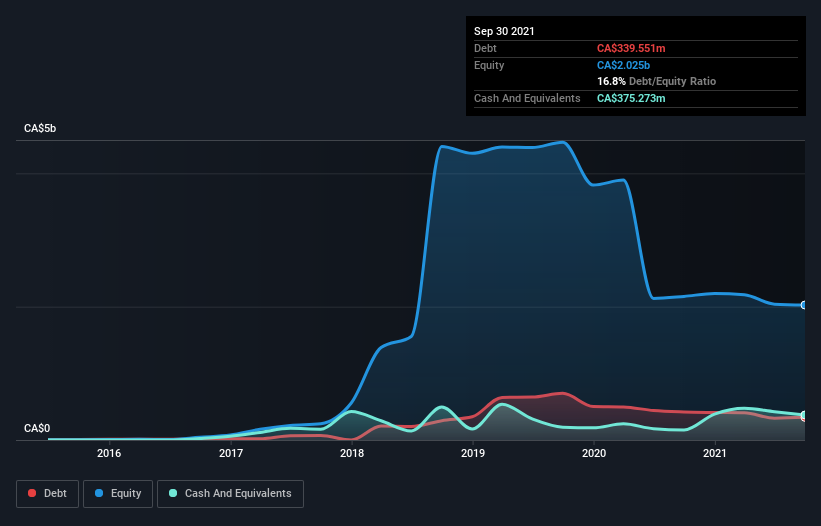
Some say volatility, rather than debt, is the best way to think about risk as an investor, but Warren Buffett famously said that 'Volatility is far from synonymous with risk.' So it might be obvious that you need to consider debt, when you think about how risky any given stock is, because too much debt can sink a company. As with many other companies Aurora Cannabis Inc. (TSE:ACB) makes use of debt. But the real question is whether this debt is making the company risky.
What Risk Does Debt Bring?
Generally speaking, debt only becomes a real problem when a company can't easily pay it off, either by raising capital or with its own cash flow. Part and parcel of capitalism is the process of 'creative destruction' where failed businesses are mercilessly liquidated by their bankers. However, a more common (but still painful) scenario is that it has to raise new equity capital at a low price, thus permanently diluting shareholders. Of course, plenty of companies use debt to fund growth, without any negative consequences. The first step when considering a company's debt levels is to consider its cash and debt together.
Check out our latest analysis for Aurora Cannabis
What Is Aurora Cannabis's Net Debt?
As you can see below, Aurora Cannabis had CA$339.6m of debt at September 2021, down from CA$420.4m a year prior. However, its balance sheet shows it holds CA$375.3m in cash, so it actually has CA$35.7m net cash.

A Look At Aurora Cannabis' Liabilities
Zooming in on the latest balance sheet data, we can see that Aurora Cannabis had liabilities of CA$120.4m due within 12 months and liabilities of CA$415.0m due beyond that. On the other hand, it had cash of CA$375.3m and CA$54.5m worth of receivables due within a year. So it has liabilities totalling CA$105.6m more than its cash and near-term receivables, combined.
Of course, Aurora Cannabis has a market capitalization of CA$1.46b, so these liabilities are probably manageable. Having said that, it's clear that we should continue to monitor its balance sheet, lest it change for the worse. Despite its noteworthy liabilities, Aurora Cannabis boasts net cash, so it's fair to say it does not have a heavy debt load! The balance sheet is clearly the area to focus on when you are analysing debt. But ultimately the future profitability of the business will decide if Aurora Cannabis can strengthen its balance sheet over time. So if you're focused on the future you can check out this free report showing analyst profit forecasts.
In the last year Aurora Cannabis had a loss before interest and tax, and actually shrunk its revenue by 9.5%, to CA$238m. We would much prefer see growth.
So How Risky Is Aurora Cannabis?
We have no doubt that loss making companies are, in general, riskier than profitable ones. And we do note that Aurora Cannabis had an earnings before interest and tax (EBIT) loss, over the last year. Indeed, in that time it burnt through CA$165m of cash and made a loss of CA$607m. With only CA$35.7m on the balance sheet, it would appear that its going to need to raise capital again soon. Summing up, we're a little skeptical of this one, as it seems fairly risky in the absence of free cashflow. The balance sheet is clearly the area to focus on when you are analysing debt. But ultimately, every company can contain risks that exist outside of the balance sheet. To that end, you should be aware of the 3 warning signs we've spotted with Aurora Cannabis .
Of course, if you're the type of investor who prefers buying stocks without the burden of debt, then don't hesitate to discover our exclusive list of net cash growth stocks, today.
New: Manage All Your Stock Portfolios in One Place
We've created the ultimate portfolio companion for stock investors, and it's free.
• Connect an unlimited number of Portfolios and see your total in one currency
• Be alerted to new Warning Signs or Risks via email or mobile
• Track the Fair Value of your stocks
Have feedback on this article? Concerned about the content? Get in touch with us directly. Alternatively, email editorial-team (at) simplywallst.com.
This article by Simply Wall St is general in nature. We provide commentary based on historical data and analyst forecasts only using an unbiased methodology and our articles are not intended to be financial advice. It does not constitute a recommendation to buy or sell any stock, and does not take account of your objectives, or your financial situation. We aim to bring you long-term focused analysis driven by fundamental data. Note that our analysis may not factor in the latest price-sensitive company announcements or qualitative material. Simply Wall St has no position in any stocks mentioned.
About TSX:ACB
Aurora Cannabis
Engages in the production, distribution, and sale of cannabis and cannabis-derivative products in Canada and internationally.
Undervalued with excellent balance sheet.

